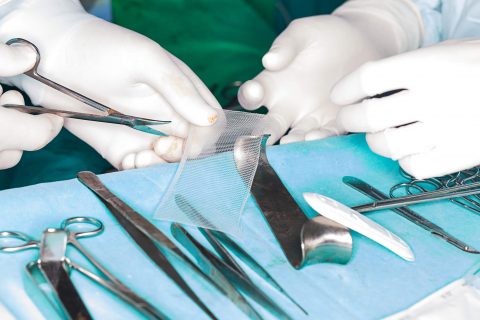Hernia Mesh Recalls
Recalled hernia mesh products include the Atrium Medical C-QUR Mesh, Bard Composix Kugel Hernia Patch and Ethicon Proceed Surgical Mesh. From 2005 to February 2019, hernia mesh manufacturers recalled more than 211,000 units of hernia mesh.
The FDA classified most of the hernia mesh recalls from 2005 to February 2019 as Class 2. A Class 2 recall means a person may suffer temporary or medically reversible adverse health consequences from the recalled product.
One recall for C.R. Bard’s Kugel Patch was a Class 1. This means the recalled product could cause serious adverse health consequences or death.
Three companies were the source of the majority of recalls: Johnson & Johnson’s Ethicon unit (which issued a market withdrawal, not a recall), C.R. Bard and Atrium.
Which Hernia Mesh Products Have Been Recalled?
Companies that issued hernia mesh recalls did so voluntarily because they discovered a problem. The FDA rarely forces a manufacturer to recall a product. Manufacturers of recalled mesh include Atrium Medical, Bard Davol, Ethicon and ACell.
Some recalls were for packaging errors. But others were for serious complications such as adhesions, bowel fistulas, punctured organs, device migration and bowel obstruction.
Others were withdrawn from the market because of higher than normal failure rates.
- Atrium Medical C-QUR Mesh
- Bard Composix Kugel Hernia Patch
- Gentrix Surgical Matrix
- Ethicon Physiomesh Flexible Composite Mesh (market withdrawal, not recall)
- Ethicon Proceed Surgical Mesh
- Parietex Composite Parastomal Mesh
Bard Composix Kugel Hernia Patch
In 2005, Bard issued the first in its series of Kugel Patch recalls. According to the recall notice, the memory recoil ring on the patch could break and cause bowel perforations and fistulas. The FDA declared it a Class I recall — the agency’s most serious type.
The company went on to issue various versions of the Kugel patch from Dec. 22, 2005 to Jan. 10, 2007 for more than 137,000 units total.
Atrium C-QUR Mesh
Atrium recalled more than 145,000 units of its C-QUR hernia mesh in 2013. Recalled models included C-QUR V-Patch, TacShield, Edge and standard C-QUR Meshes.
The FDA classified the recall as a Class 2. Atrium said high humidity could cause the mesh to stick to the inner package liner.
Ethicon Proceed and Physiomesh
From 2005 to 2014, Ethicon recalled more than 18,000 units of its Proceed hernia mesh. The FDA classified the recall as Class 2.
According to the recall notices, packaging or other problems could cause “delamination,” meaning the mesh could lose its coating. This could increase the risk of adhesions and bowel fistulas after the mesh is implanted.
In 2016, Ethicon recalled all unused stock of its Physiomesh Flexible Composite mesh for laparoscopic use in Australia and Europe after two large independent registries in Germany and Denmark showed a higher recurrence and reoperation rate compared to similar products.
Instead of issuing a recall in the United States, it issued a market withdrawal.
Gentrix Surgical Matrix
ACell issued a minor recall in February 2019 for two devices in its Gentrix Surgical Matrix Thick, 20 x 30cm and Gentrix Surgical Matrix Thick, 30 x 40cm. According to the recall notice, only two products are included in this recall, and they failed to meet the company’s tensile strength specifications.
Unlike the other recalled devices that are made of polypropylene plastic, Gentrix Surgical Matrix meshes are made from biologic products and are designed to dissolve over time.
Parietex Composite Parastomal Mesh
In October 2018, Covidien LLC — a subsidiary of Medtronic — recalled 7,333 units of its Parietex Composite Parastomal Mesh.
The company said it was recalling these devices because of “mesh failure identified several years following parastomal hernia repair using the modified Sugarbaker repair technique.” It led to recurrence, pain, bulging and overlying skin changes.
Medtronic said it received a total of ten reports of mesh failure worldwide in the last five years.
FDA Warns About Complications from Recalled Mesh
The FDA issued a safety communication on hernia mesh in 2014. It warned the public about hernia mesh complications. The agency identified six of the most common complications from recalled mesh.
Recurrence was the most common complication before the hernia mesh’s invention. Research is mixed on how long a mesh hernia repair will last. A 2022 study followed 100 patients for ten years after a ventral abdominal hernia repair.
No recurrence was recorded after three years, while about 10% had a recurrence after roughly eight years. Two patients had a central breakdown of the mesh at about seven years. Mesh had stretched across the defect by an average of 21%. Mechanical testing showed that the mesh lost its elasticity at low forces.
FDA Warnings
In 2015, the FDA asked a court for an injunction against mesh manufacturer Atrium Medical. Atrium manufactures C-QUR hernia mesh.
The agency said Atrium ignored repeated warnings about problems at its C-QUR factory. The injunction blocked C-QUR manufacturing and sales until Atrium fixed the problems.
The FDA attributed recalled mesh for complications people reported to the agency.
“Many complications related to hernia repair with surgical mesh that have been reported to the FDA have been associated with recalled mesh products that are no longer on the market”
C-QUR has been one of the most high-profile hernia mesh recalls in recent years. Ethicon’s Physiomesh Flexible Composite Mesh has been the other.
The FDA has different definitions for recalls and market withdrawals. Market withdrawals happen when the violation is not subject to legal action. Companies can take the product off the market or fix its violation. This way, manufacturers avoid a recall.
-
2006
FDA approved Atrium’s first C-QUR mesh products
-
2010
FDA approved Ethicon’s Physiomesh Flexible Composite Mesh
-
2012
FDA issued a warning letter to Atrium Medical. It said Atrium failed to address reported infections. The FDA also said that Atrium’s sterilization process was inadequate.
-
2015
Federal court granted FDA an injunction against Atrium. It ordered Atrium to stop distribution and manufacturing of medical devices from the company’s Hudson, New Hampshire, plant. The shutdown was in effect until Atrium complied with certain Federal Food, Drug, and Cosmetic Act provisions.
-
2016
Two, large European hernia registries reported higher than average failure rates for Physiomesh Flexible Composite Mesh.
-
2016
Ethicon issued a “market withdrawal” of Physiomesh Flexible Composite Mesh products.
-
2018
FDA analysis found that recalled mesh is responsible for some of the most serious complications.
-
2018
FDA averaged more than 500 adverse event reports per month for all types of surgical mesh. This included almost 300 reports for Physiomesh and 200 for C-QUR in the first three months of the year.
Recalled Mesh Lawsuits and Settlements
Patients who suffered hernia mesh injuries are suing mesh manufacturers. They claim that the mesh was faulty and poorly designed. The lawsuits accuse manufacturers of hiding the risks.
Most current hernia mesh lawsuits target Bard’s polypropylene hernia mesh, Ethicon’s Physiomesh and Atrium’s C-QUR brands. All are the subject of separate multidistrict litigations (MDLs). MDLs combine several similar lawsuits for efficiency.
Bard Davol faced more than 3,000 lawsuits in an MDL for the Kugel patch. After a trial loss, it settled 2,600 lawsuits for $184 million, and the MDL closed in 2017.
- Ethicon faces 3,128 Physiomesh lawsuits in a federal MDL.
- Atrium faces 2,378 C-QUR mesh lawsuits in federal court.
- Bard faces 9,394 MDL lawsuits for several of its polypropylene hernia mesh brands.
- Bellwether trials are scheduled for 2021 in federal MDLs for Atrium, Bard and Ethicon.
What Should I Do If My Hernia Mesh Is Recalled?
If your mesh is recalled but you aren’t experiencing any problems, then you don’t need to have the mesh removed or take any action.
If your mesh is on the recall list and you are suffering complications, the first thing you should do is speak to your doctor. Some complications from recalled mesh can be serious and need to be treated right away. Your doctor can help you figure out if your mesh is causing problems and if you need another surgery.
If you suffered complications from recalled mesh and you have had surgery to remove the mesh, have scheduled a surgery or have been told that you need surgery but can’t have it because it’s too risky, you may qualify for a hernia mesh lawsuit.
If you know you might file a lawsuit, make sure to preserve the hernia mesh for evidence after surgery.
Calling this number connects you with a Drugwatch.com representative. We will direct you to one of our trusted legal partners for a free case review.
Drugwatch.com's trusted legal partners support the organization's mission to keep people safe from dangerous drugs and medical devices. For more information, visit our partners page.







